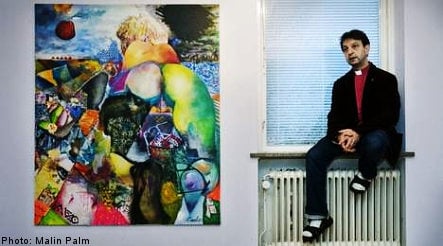The church’s founder, artist Carlos Bebeacua who resides in Lövestad in southern Sweden, has been fighting a lengthy legal battle in his bid to have the Madonna of Orgasm Church registered as a faith community in Sweden.
Founded by Bebeacua in the early 1990s, the Madonna of Orgasm Church is centered on a similarly named painting by Bebeacua which sparked protests during the 1992 World’s Fair in Seville, Spain.
“The orgasm is God, the orgasm should be worshiped,” Bebeacua once told the Kvällsposten newspaper.
“The orgasm is the ultimate feeling of lust, it shouldn’t be limited to ejaculation. You can reach it through art or by looking at a landscape and thinking ‘Wow!’”
Bebeacua hoped that registering the Madonna of Orgasm Church as a faith community in Sweden would encourage more people to consider the orgasm as God.
In November 2008, he achieved an important victory when the county administrative court overruled Sweden’s Legal, Financial and Administrative Services Agency (Kammarkollegiet), which had refused to register the Madonna of Orgasm Church because its name was offensive.
But Kammarkollegiet appealed the ruling to the Administrative Court of Appeal, which on Tuesday overturned the lower court’s decision.
According to the appeals court, the name of Bebeacua’s Madonna of Orgasm Church “violates what is considered acceptable praxis” and therefore can be denied registration as a faith community.
Specifically, the court took issue with juxtaposition of the words “Madonna”, “orgasm”, and “church”.
“In the opinion of the administrative court of appeal, the intention of such a combination of words, even in relation to the registration of a community for religious activities, must be to offend, not only for those within the wider circles of the general public who have Christian leanings, but also in society in general,” wrote the court.


 Please whitelist us to continue reading.
Please whitelist us to continue reading.